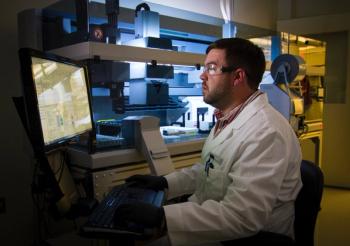
A cancer diagnosis often means putting your life in the hands of people you hardly know.

A cancer diagnosis often means putting your life in the hands of people you hardly know.

The day I got diagnosed with cancer, I went from “person” to “patient” — and the title has followed me ever since.

In part of the “Star Wars” saga, a character mentions that rebellions are built on hope. After being diagnosed with cancer, I’ve realized that the same is true for patients with the disease.

Experts are concerned that the train derailment in Ohio may pose cancer risks down the line.

A new standard of care for advanced pancreatic neuroendocrine tumors demonstrates improvements in survival and tumor shrinkage.

Researchers just launched a phase 2 trial evaluating iadademstat plus paclitaxel in patients with relapsed/refractory neuroendocrine cancer, including those with small cell lung cancer.

Maintaining independence was found to the be the most common health care goal in patients with stage 4 neuroendocrine tumors, a recent survey found.

A woman with a rare and aggressive cancer shares how writing about the realities of cancer survivorship improved her mental health and even helped strengthen her relationship with her family.

A phase 2 clinical trial will evaluate iadademstat for patients with relapsed or refractory high-grade neuroendocrine carcinoma.

A novel drug, MRT-2359, will be studied in a phase 1/2 trial for patients with MYC-driven cancers.

The Food and Drug Administration will fast track the development and review of ITM-11 for the treatment of gastroenteropancreatic neuroendocrine tumors.

I’ve always received impeccable care at my cancer center, but a recent experience made me feel like I was no longer a priority.

Before being diagnosed with neuroendocrine cancer, I started to live a healthier life and took notice of some concerning symptoms.

The Food and Drug Administration plans on reviewing multiple new cancer therapies this spring.

When I was first diagnosed with a stage 4 neuroendocrine tumor in my small intestine, I went through three stages of coping with my cancer: anger, planning and living life.

The phase 3 COMPOSE trial will look at the efficacy of using 177lu-edotreotide — a novel radiopharmaceutical that is designed to limit radiation exposure to normal tissue — in patients with later stage neuroendocrine tumors.

For patients with neuroendocrine tumors that have spread, curating a liver-directed approach may make their treatment process less risky and less invasive, according to an expert.

Catching tumors through imaging at an early stage can help guide treatment decisions and may improve a patient’s quality of life — which is why it’s important for patients to stay educated on their options.

It is vital to find support when your child has cancer. In this two-part episode of the “CURE® Talks Cancer” podcast, a family shares how they were able to remain strong as their 9-year-old was treated for neuroendocrine cancer.

Where do you turn when your child is diagnosed with a rare cancer? In this two-part episode of the “CURE® Talks Cancer” podcast, a family shares the harrowing experience of learning their nine-year-old had neuroendocrine cancer.

The combination of Inlyta (axitinib) and the synthetic hormone octreotide acetate failed to significantly improve progression-free survival, compared to placebo with the synthetic hormone. However, the results indicated the Inlyta-based combination did improve disease response in patients versus the placebo-based combination.

Often uncovered by accident, appendiceal cancers trigger few symptoms until they’re advanced and can be difficult to detect and treat.

From a renowned actor passing away after a rare neuroendocrine cancer diagnosis and years of treatment to LUNGevity announcing a new fund for patients with lung cancer in need of financial assistance during the COVID-19 pandemic, here’s what’s happening in the cancer space this week.

COVID-19 has forced many people into a “new normal” that they aren’t familiar with and may not be equipped to handle. But cancer survivors are more prepared than most to handle the ramifications of the pandemic.

Treatment with Opdivo (nivolumab) plus Yervoy (ipilimumab) led to a 44% response rate in patients with high-grade neuroendocrine tumors, according to phase 2 study findings.